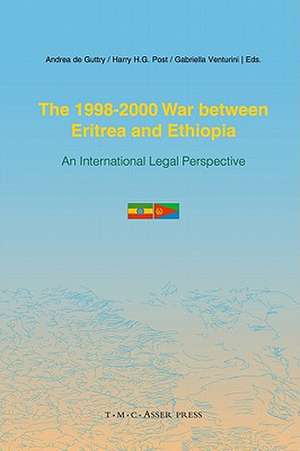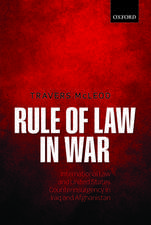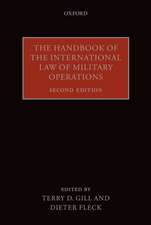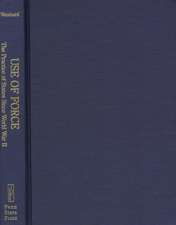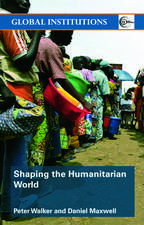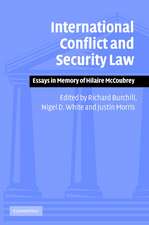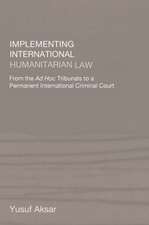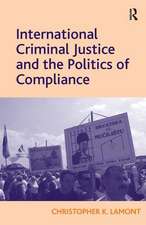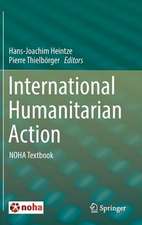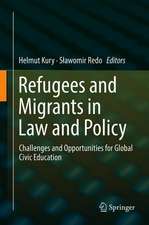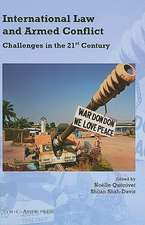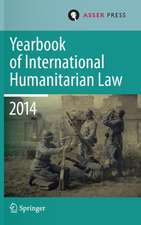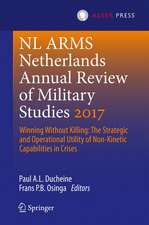The 1998–2000 War Between Eritrea and Ethiopia: An International Legal Perspective
Editat de Andrea de Guttry, Gabriella Venturini, Harry H.G. Posten Limba Engleză Hardback – 12 aug 2009
The war that raged between Eritrea and Ethiopia from 1998 to 2000 has caused great loss of life and tremendous devastation. This book analyses from an international legal perspective the nature and the state of the boundary conflict preceding the actual armed conflict, the military actions themselves as well as developments in the aftermath of the military activities, like the role of the UN peace-keeping deployment and the responsibility for the multitude of explosive remnants of the war.
The authors address the complex issues of responsibility for the use of force, violations of humanitarian law and ‘borderline’ issues regarding situations where the law of armed conflict and the (successive) law of peace meet. Ample attention is paid to the decisions of the Eritrea-Ethiopia Claims Commission and the Eritrea-Ethiopia Boundary Commission.
The analysis of this war is not limited to international legal issues, but has been placed in a wider than strictly legal perspective. It is a valuable work for academics and practitioners in international law, political scientists, diplomats, civil servants and historians.Andrea de Guttry is Professor of International Law at the Scuola Superiore Sant'Anna di Studi Universitari e di Perfezionamento, Pisa, Italy. Harry Post is Professor of International Law at the Università degli Studi di Modena e Reggio Emilia, Italy. Gabriella Venturini is Professor of International Law at the University of Milan, Italy.
The authors address the complex issues of responsibility for the use of force, violations of humanitarian law and ‘borderline’ issues regarding situations where the law of armed conflict and the (successive) law of peace meet. Ample attention is paid to the decisions of the Eritrea-Ethiopia Claims Commission and the Eritrea-Ethiopia Boundary Commission.
The analysis of this war is not limited to international legal issues, but has been placed in a wider than strictly legal perspective. It is a valuable work for academics and practitioners in international law, political scientists, diplomats, civil servants and historians.Andrea de Guttry is Professor of International Law at the Scuola Superiore Sant'Anna di Studi Universitari e di Perfezionamento, Pisa, Italy. Harry Post is Professor of International Law at the Università degli Studi di Modena e Reggio Emilia, Italy. Gabriella Venturini is Professor of International Law at the University of Milan, Italy.
Preț: 965.52 lei
Preț vechi: 1177.46 lei
-18% Nou
Puncte Express: 1448
Preț estimativ în valută:
184.75€ • 190.60$ • 154.18£
184.75€ • 190.60$ • 154.18£
Carte tipărită la comandă
Livrare economică 27 martie-10 aprilie
Preluare comenzi: 021 569.72.76
Specificații
ISBN-13: 9789067042918
ISBN-10: 9067042919
Pagini: 526
Ilustrații: 548 p.
Greutate: 1.02 kg
Ediția:1st Edition.
Editura: T.M.C. Asser Press
Colecția T.M.C. Asser Press
Locul publicării:The Hague, Germany
ISBN-10: 9067042919
Pagini: 526
Ilustrații: 548 p.
Greutate: 1.02 kg
Ediția:1st Edition.
Editura: T.M.C. Asser Press
Colecția T.M.C. Asser Press
Locul publicării:The Hague, Germany
Public țintă
ResearchDescriere
process of demarcation stalled. Later it was resumed, but since November 2008 the activities of the EEBC have stopped without a final solution. Since July 2003, the Eritrea-Ethiopia Claims Commission has issued a considerable number of de- sions on claims by either Party on a wide variety of subjects, e. g. , the treatment and exchange of prisoners of war, aerial bombardments, claims of civilians, liability issues, etc. In 2005 and 2007, the Commission issued further partial and final awards on issues of diplomatic law, economic relations during armed conflict (including on the taking and destruction of property) and on various claims regarding violations of International Humanitarian Law. These will be discussed and examined in Part V, in light of the current legal framework. Undoubtedly, the Commission has brought considerable innovations to the state of the law. Its decision on the jus ad bellum is particularly striking. The EECC found that in 1998 Eritrea had launched armed attacks on Ethiopia in violation of the prohibition on the threat and the use of force. In Part IV this ‘central’ decision is extensively discussed and commented upon. In the next and final phase of its activities the Claims Commission will assess damages and award compensation for the successful claims. In Part VI the fra- work of the law of state responsibility and of compensation and damages as it stands now is examined and explained taking into account important modern armed c- flicts such as the Gulf Wars.
Cuprins
The Historical Background of the Conflict Between Eritrea and Ethiopia.- The Lines of Tension in the Horn and The Ethiopia-Eritrea Case.- The Historical Background of the 1998-2000 War: Some Salient Points.- Rivalry, Antagonism and War in the Nation & State-Building Process: The H Factor in the Relations Between Eritrea and Ethiopia.- The International Legal Framework for the Settlement of the Dispute.- The 2000 Algiers Agreements.- The Un Mission in Ethiopia and Eritrea (Unmee).- Some Remarks on the Nature and Practice of Unmee.- The Boundary Dispute.- The Eritrean-Ethiopian Boundary Conflict: the Physical Borderand the Human Border.- Law Against Reality? Contextualizing The Ethiopian-Eritrean Border Problem.- Indigenous Statehood and International Law in Ethiopia and Eritrea.- The Eritrea-Ethiopia Boundary Commission: a Legal Analysis of the Boundary Delimitation Decision of 13Th April 2002 and Relevant Subsequent Decisions.- The Eritrea-Ethiopia Dispute and the Use of Force.- International Law as to the Use of Force.- The Crime of Aggression and the Eritrea-Ethiopia Armed Conflict.- Criminal Responsibility and the Crime of Aggression: Some Observations.- The Eritrea-Ethiopia Claims Commission on the Threat Or Use of Force and Individual Self-Defence.- The Eritrea-Ethiopia War and the Law of Armed Conflict.- International Law and the Conduct of Military Operations.- International Humanitarian Law and the Treatment of Protected Persons.- The Approach of the Eritrea-Ethiopia Claims Commission Towards the Treatment of Protected Persons in International Humanitarian Law.- The Belligerent Occupation of Territory.- The Law of Belligerent Occupation: The Distinction Between Invasion And Occupation of Disputed Territory.- International Economic Relations and Armed Conflict.- Some Remarks on The Protection Of Property Rights in Time of Armed Conflict.- Issues in the Jus post Bellum.- State Responsibility For Violations of International Humanitarian Law in the Work of The Eritrea-Ethiopia Claims Commission.- The Claims on Behalf of Individuals Before the Eritrea-Ethiopia Claims Commission.- Compensation for War Damages Under Jus ad Bell UM.- Some Remarks on Compensation fo War Damages Under Jus ad Bellum.- The Role of Intergovernmental Agencies in the Management of Human Rights Risk.- Explosive Remnants of War.
Textul de pe ultima copertă
The war that raged between Eritrea and Ethiopia from 1998 to 2000 has caused great loss of life and tremendous devastation. This book analyses from an international legal perspective the nature and the state of the boundary conflict preceding the actual armed conflict, the military actions themselves as well as developments in the aftermath of the military activities, like the role of the UN peace-keeping deployment and the responsibility for the multitude of explosive remnants of the war.
The authors address the complex issues of responsibility for the use of force, violations of humanitarian law and ‘borderline’ issues regarding situations where the law of armed conflict and the (successive) law of peace meet. Ample attention is paid to the decisions of the Eritrea-Ethiopia Claims Commission and the Eritrea-Ethiopia Boundary Commission.
The analysis of this war is not limited to international legal issues, but has been placed in a wider than strictly legal perspective. It is a valuable work for academics and practitioners in international law, political scientists, diplomats, civil servants and historians.Andrea de Guttry is Professor of International Law at the Scuola Superiore Sant'Anna di Studi Universitari e di Perfezionamento, Pisa, Italy. Harry Post is Professor of International Law at the Università degli Studi di Modena e Reggio Emilia, Italy. Gabriella Venturini is Professor of International Law at the University of Milan, Italy.
The authors address the complex issues of responsibility for the use of force, violations of humanitarian law and ‘borderline’ issues regarding situations where the law of armed conflict and the (successive) law of peace meet. Ample attention is paid to the decisions of the Eritrea-Ethiopia Claims Commission and the Eritrea-Ethiopia Boundary Commission.
The analysis of this war is not limited to international legal issues, but has been placed in a wider than strictly legal perspective. It is a valuable work for academics and practitioners in international law, political scientists, diplomats, civil servants and historians.Andrea de Guttry is Professor of International Law at the Scuola Superiore Sant'Anna di Studi Universitari e di Perfezionamento, Pisa, Italy. Harry Post is Professor of International Law at the Università degli Studi di Modena e Reggio Emilia, Italy. Gabriella Venturini is Professor of International Law at the University of Milan, Italy.
